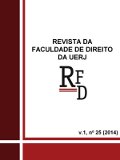LABOR FLEXIBILIZATION AND THE RECENT CHANGES IN THE JURISPRUDENCE AND TST STF: theoretical and practical aspects
DOI:
https://doi.org/10.12957/rfd.2014.5088Keywords:
Labor flexibilization. Labor’s social values and free initiative. Moderate current.Abstract
The acknowledge of fundamental labor rights and its normative force represents an achievementobtained through intense struggles and various social movements. Nevertheless, laborflexibilization is an increasingly recurrent theme, as a relevant social and legal phenomenonthat deserves a satisfactory solution by Law. The Brazilian Federal Constitution of 1988 in itsfirst article, consecrates labor’s social values and free initiative as the foundations of theFederative Republic of Brazil. Therefore, the adoption of a theory that coordinates those twoprinciples, so that the core labor rights remains intangible non denatured behold, composeswhat is called the minimum level of civilization. According to the view adopted the thesis thatshould be taken and which better suits and ensures the concomitant effectiveness between socialrights of workers and free initiative is the moderate current.Published
How to Cite
Issue
Section
License
Copyright
oArticles published in the Revista da Faculdade de Direito da UERJ (RFD/UERJ)
The copyrights of the published articles belong to the Revista da Faculdade de Direito da UERJ (RFD/UERJ). Total or partial reproduction of the articles is allowed as long as the source is cited.
oPartial reproduction from other publications
Submitted papers that contain parts of text extracted from other publications must obey the specified limits to ensure originality of the submitted work. Plagiarism in all its forms constitutes unethical behavior and is unacceptable.
It is recommended to avoid reproduction of tables and illustrations from other publications. The article that contains reproduction of one or more tables and/or illustrations from other publications will only be sent for analysis if it is accompanied by written permission from the copyright holder of the original work for the specified reproduction in the Revista da Faculdade de Direito da UERJ (RFD/UERJ). The permission must be addressed to the author of the submitted work. Under no circumstances will the Journal of the Law School of the State University of Rio de Janeiro (RFD/UERJ) and the authors of the papers published in this journal transfer the rights thus obtained.
•The refused studies will be returned to the authors, if asked.

The Revista da Faculdade de Direito is licensed under a Creative Commons Atribuição 4.0 Internacional License.
This work is licensed under a Creative Commons 4.0 Attribution-No Derivation License.
This license allows copying and redistribution of the material in any medium or format for any purpose, even commercial, provided that the original authorship is acknowledged.










